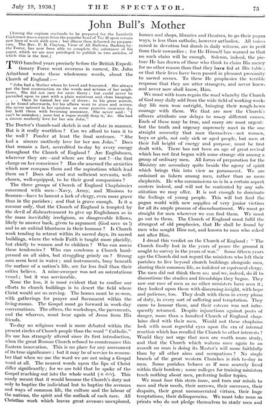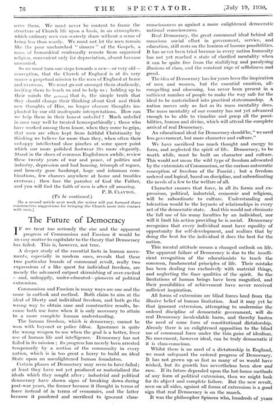John Bull's Mother
[Among the copious cogitanda to be prepared for the Lambeth Conference was a report from the popular head of Toe H upon certain new lines of work with men ; but illness then debarred its prepara- tion. The Rev. P. B. Clayton, Vicar of All Hallows, Barking-by- the-Tower, has now been able to complete the substance of his paper, which we are now privileged to publish in two articles, of which this is the first.]
TWO hundred years precisely before the British Expedi- tionary Force went overseas in earnest, Dr. John Arbpthnot wrote these wholesome words, about the Church of England :- "John had a Mother whom he loved and honoured. She always put the beat construction on the words and actions of her neigh- bours. She did not care for mere finery ; but could never be prevailed upon to part with a plain waistcoat and clean hangings. . . . Once he turned her out of doors ; to his great sorrow, as he found afterwards, for his affairs went to sixes and sevens. She never ushered in her opinions as some positive creatures do, but held them with becoming assurance. She never said : ' I can't be mistaken none but a rogue would deny it,' dm. She bad a sincere motherly love for her son John."
The Doctor's thumb-nail sketch is out of date in manner. But is it really worthless ? Can we afford to turn it to the wall ? Ponder at least the final sentence. " She had a sincere motherly love for her son John." Does that remain a fact, accredited to-day by every energy throughout the Church of England ? Are Englishmen, wherever they are—and where arc they not ?—the first charge on her conscience ? Has she assessed the anxieties which now compass them and the aspirations which lead them on ? Does she send out sufficient servants, well- chosen, well-equipped, to be their good companions ?
The three groups of Church of England Chaplaincies concerned with men—Navy, Army, and Missions to Seamen—have to lament a lack of clergy, even more grave than in the parishes ; and that is grave enough. Is it a rumour only, that the Church of England is tempted by the devil of disheartenment to give up Englishmen as in the mass inevitably irreligious, as disagreeable fellows, likely to answer back, given to argument (God save us !) and to an unkind bluntness in their humour ? Is Church work tending to retreat within its sacred days, its sacred buildings, where the whole Faith is taught more placidly, but chiefly to women and to children ? Who can assess these tendencies ? Who can condemn a Church hard- pressed on all sides, but struggling grimly on ? Strong oars seem bent in water ; and instruments, busy beneath the surface of a nation's life, are far less frail than their critics believe. A mine-sweeper was not an ostentatious vessel ; but it was serviceable.
None the less, it is most evident that to confine our efforts to church buildings is to desert the field where Christ would see us serving. The homes must be re-won, with gatherings for prayer and Sacrament within the living-rooms. The Gospel must go forward in week-day conversations. The offices, the workshops, the pavements, and the wharves, must hear again of Jesus from His friends.
To-day no religious word is more debated within the present circles of Church people than the word " Catholic." Its use has strangely altered since its first introduction, when the great Roman Church refused to countenance this Eastern innovation. This is no place for any assessment of its true significance ; but it may be of service to remem- ber that when we use the word we arc not using a Gospel word at all. The nearest words upon the lips of Christ differ significantly; for we are told that he spoke of the Gospel reaching out into the whole world (as AG). This surely meant that it would become the Church's duty not only to baptise the individual but to baptize the avenues and ways of common life, the culture and the labour of the nations, the spirit and the outlook of each race. All Christian work which leaves great avenues unexplored, houses and shops, libraries and theatres, to go their pagan ways, is less than catholic, however orthodox. All voices raised in devotion but dumb in daily witness, are in peril from their cowardice ; for He Himself has warned us that no such claim will be enough. Solemn, indeed, the pic- ture He has drawn of those who think to claim His mercy for no other reason than that they have fed at Ills table ; or that their lives have been passed in pleasant proximity to sacred scenes. To these He prophesies the terrible response that they are utter strangers, and never knew. and never now shall know, Him.
We must with tears regain the road whereby the Church of God may daily add from the wide field of working week- day life men won outright, bringing their rough-hewn courage with them. We that are now the Church's officers attribute our delays to many different causes. Each of these may be true, and many are most urgent; but the truth and urgency supremely meet in the one straight necessity that men themselves—not women, boys or girls, not only sick or aged people, but men at their full height of energy and purpose, must be first dealt with. There has not been an age of great revival which has not first begun with sonic strange stir among a group of ordinary men. All forms of preparation for the Ministry are secondary quite beside the agony of spirit which brings this into view as paramount. We are ordained as fishers among men, rather titan as mere shepherds. He who commissions us is in a certain aspect austere indeed, and will not be contented by any sub7 stitution we may offer. It is not enough to dominate the feelings of young people. This will but feed the pagan world with new supplies of very junior victims for all its ample process of disenchantment. We must go straight for men wherever we can find them. We must go out to them. The Church of England must fulfil the strangest of old prophecies, that He shall be found by men who sought Him not, and known to men who asked not after Him.
I dread this verdict on the Church of England : " The Church finally lost in the years of peace the ground it sought to survey in the years of war." Some fifteen years ago the Church did not regard the ministers who left their parishes to live beyond church buildings alongside men, sharing their common life, as indolent or equivocal clergy. The men did not think them so; and we, indeed, do ill to discontinue the studies and friendships they began. They saw our race of men as no other ministers have seen it ; they looked upon them with discerning insight, with hope and patience, too. They dealt with them in every phase of duty, in every sort of suffering and temptation. They came to honour them, and their esteem was not infre- quently returned. Despite injunctions against posts of danger, more than a hundred Church of England chap- lains died with their men. Would not these chaplains look with most regretful eyes upon the era of internal reaction which has recalled the Church to other interests ? Would they not urge that men are worth more study, and that the Church which wakens once again to an assault on man is doing its Master's will more faithfully than by all other aims and occupations ? No single branch of the great western Churches is rich to-day in men. Some parishes behave as if men scarcely lived within their borders ; some colleges for training ministers teach nothing about men, preferring holier topics.
We must face this stern issue, and turn our minds to men and their needs, their sorrows, their successes, their despairs, their great unconsecrated virtues, their huge temptations, their delinquencies. We must take none as priests who do not pledge themselves to study men and serve them. We must never be content to frame the structure of Church life upon a basis, in an atmosphere, which ordinary men can scarcely share without a sense of being less than manly. We must not let the men remain like the poor unchurched " sinners " of the Gospels, a mass of humankind confessedly remote from organized religion, convenient only for depreciation, absent because unwanted.
So we must turn our steps towards a new—or very old— conception, that the Church of England is at its very source a perpetual mission to the men of England at home and overseas. We must go out amongst them studiously, inviting them to teach us and to help us ; holding up to their minds the that is, the simple truth that they should change their thinking about God and think new thoughts of Him, no longer obscure thoughts im- planted by our old inadequate interpretations. How can we help them in their honest unbelief ? Much unbelief in men may well be treated homeopathically ; those who have worked among them know, when they come to grips, that men are often kept from faithful Christianity by thinking we believe far more than they, when often their unhappy intellectual shoe pinches at some queer point which our more polished footwear fits more elegantly. Stand in the shoes of common Englishmen awhile, review these twenty years of war and peace, of politics and industry, depression and bad housing, triumph of rogues, and honesty gone bankrupt, huge and inhuman com- binations, few chances anywhere at home and troubles overseas ; then face the paradox of God the Father, and you will find the faith of men is after all amazing. P. B. CLAYTON. (To be continued.)
[In a second article next week the writer will put forward three constructive suggestions fur bringing the Church more into contact with men.]

















































 Previous page
Previous page